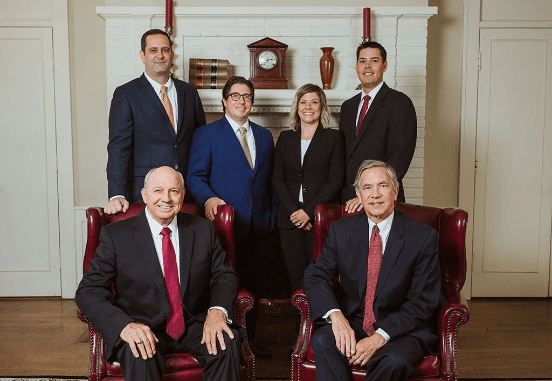Why Trust Wooten, Kimbrough, Damaso, and Dennis, P.A. with Your Orlando Uber Accident Case?
You may be wondering what you should do if you’ve been injured in an Uber auto accident in Orlando. Many people believe that the insurance company will pay what is owed to the victim without any problems, simply because it is the right thing to do. Unfortunately, this is rarely true in any accident case.
If you’ve been hurt as an Uber passenger or you were struck by an Uber in your own vehicle, you may have grounds for a claim. Rideshare accident claims can quickly become convoluted, so it’s important to work with an Orlando Uber accident lawyer who understands how their insurance policy works, when it kicks in, and how to fight for the compensation you deserve. Here’s how our Orlando personal injury law firm stands out:
- Proven Track Record: We’ve recovered millions of dollars for our clients and have established ourselves as trusted advocates for Orlando uber accident victims, including both local residents and tourists.
- No Win, No Fee: Our firm operates on a contingency fee basis, meaning you don’t pay unless we win your case.
- Extensive Experience: We’ve helped the injured since 1966 and have the knowledge and resources to fight for the fair compensation you deserve, whether you’re dealing with catastrophic injuries, wrongful death, or the complexities of Florida’s no-fault insurance laws.
- Deep Knowledge of Insurance Processes: Navigating the complexities of insurance claims can be challenging, whether you’re a local resident or a visitor unfamiliar with Florida’s no-fault system. Our deep understanding of insurance company processes allows us to advocate strongly on your behalf, ensuring that your rights are protected.
- Expert Negotiators: Our Orlando personal injury attorneys have extensive experience in dealing with insurance companies and their tactics to minimize payouts, ensuring you receive the maximum compensation possible.
- Comprehensive Case Handling: We handle all types of auto accident cases, from rear-end collisions to complex rollover accidents, with a deep understanding of Orlando’s unique driving challenges.
- Support for Tourists and Visitors: Orlando is a major tourist destination, and we frequently assist out-of-town visitors who have been involved in rideshare accidents while on vacation. Whether you live in Florida or are visiting from another state or country, our team is equipped to manage your case efficiently and effectively, even after you’ve returned home.
- Holistic Support: We understand that auto accidents can have far-reaching consequences beyond physical injuries. Many accident victims experience emotional trauma, anxiety, and financial stress. Our attorneys provide compassionate guidance to help you navigate these challenges.
- Personalized Legal Representation: We pride ourselves on our commitment to our clients and our ability to deliver results. We tailor our legal representation to your unique needs, offering aggressive advocacy and compassionate support through every step of the process.
- Experience with Various Types of Accidents: Our experience extends beyond car accidents to include pedestrian, commercial vehicle, truck, bicycle, and motorcycle accidents, allowing us to provide comprehensive representation no matter the circumstances of your case.
- Specialized Knowledge: Our attorneys bring specialized knowledge in handling cases involving Lyft, Uber, and other ride-sharing services, as well as delivery trucks and taxis, ensuring all aspects of your accident are thoroughly addressed.
We pride ourselves on our commitment to our clients and our ability to deliver results. We understand the challenges that Orlando Uber accident victims face, and we are dedicated to providing personalized legal representation tailored to your unique needs.
Contact us today for a free consultation by calling (407) 843-7060 or filling out our contact form if you’ve been injured in a car accident in Central Florida.
Why Do I Need an Orlando Rideshare Accident Lawyer?
If you’ve been in an accident involving an Uber vehicle, it is in your best interest to consult a uber accident attorney as soon as possible. Dealing with the aftermath of an Uber accident can be complicated. There may be several parties involved in your claim, and it might not be immediately clear who you should file a claim against. If multiple parties are at fault, your attorney will know how to proceed with a strong case so you can hold everyone accountable for their actions. Your attorney will also have the resources necessary to preserve evidence from the rideshare apps and accident scene before it is destroyed.
An attorney from Wooten, Kimbrough, Damaso, and Dennis, P.A. will help you pursue compensation owed to you, including compensation for medical bills, lost wages, and pain and suffering.
What to Do if You’re in an Uber Accident
If you’ve been in a rideshare accident, you need to consult a taxi accident lawyer as soon as possible. Even if you aren’t sure of the extent of your injuries, it’s still important to rely on professional help. If you were injured in the collision and one of the following applies to you, you may be entitled to significant compensation:
- You were a passenger in an Uber vehicle (regardless of whether it was your driver’s fault).
- You were a motorist who was in an accident with an Uber driver, and it was the Uber driver’s fault.
- You were an Uber driver who had an accident, but it was not your fault.
- You were a pedestrian, and an Uber driver hit you.
Once again, make sure to consult with an Uber accident lawyer before talking to any insurance companies. Do not agree to anything or accept any kind of compensation before consulting an attorney.
Contact a Trusted Orlando Uber Accident Attorney
After a car accident, it can be challenging to get through your day-to-day tasks, let alone pursue a legal claim against one of the largest rideshare companies in the world. The Orlando car accident lawyers with Wooten, Kimbrough, Damaso, and Dennis, P.A. have more than 60 years of experience pursuing justice for injured parties throughout Orlando, and will do what it takes to provide you with peace of mind during this time.
For a free consultation, call (407) 843-7060 or fill out our contact form. Our team does not charge any fees unless and until we win your case.
Frequently Asked Questions About Uber Accidents in Orlando, FL
Who can be held liable in an Uber accident in Orlando?
Liability in an Orlando Uber accident depends on the circumstances. The at-fault party could be the Uber driver, another motorist, or both. In many cases, Uber’s commercial insurance policy may cover passengers if the driver was logged into the app and actively on a trip. An Orlando Uber accident lawyer can investigate the accident report, insurance policies, and rideshare coverage to determine who is financially responsible.
Does Uber provide insurance coverage for passengers and drivers?
Yes. Uber provides tiered insurance coverage in Florida depending on the driver’s app status. If the driver is offline, only their personal insurance applies. If the driver is online but waiting for a ride request, Uber provides limited liability coverage. Once a ride is accepted and until it is completed, Uber’s $1 million liability policy typically applies. An Orlando Uber accident attorney ensures claims are filed correctly under Florida law to maximize coverage.
What compensation can I recover after an Uber accident?
Victims of Uber accidents in Orlando may be entitled to compensation for medical expenses, lost wages, pain and suffering, property damage, and long-term rehabilitation costs. In severe cases, claims may also include future income loss or wrongful death damages. A skilled Orlando uber accident lawyer negotiates with insurance companies and, if needed, pursues litigation to secure fair compensation under Florida law.
Do I need a lawyer if I was injured in an Uber accident in Orlando?
While you can technically file a claim without legal help, Orlando uber accident cases are complex due to overlapping personal and corporate insurance policies. Insurance adjusters often minimize payouts. An experienced Orlando Uber accident lawyer helps prove liability, gathers medical records, calculates damages, and protects your rights against insurers operating in Florida.
How long do I have to file a claim after an Orlando Uber accident?
In Florida, the statute of limitations for most car accident claims, including Uber accidents, is typically two years from the date of the accident. Missing this deadline can permanently bar you from recovering compensation. It’s crucial to contact an Orlando Uber accident attorney as soon as possible to preserve evidence, file claims on time, and avoid legal pitfalls.

Legally Written and Reviewed by a Managing Partner
Wooten, Kimbrough, Damaso, and Dennis, P.A.
Our content is written and reviewed by our founding attorneys Butch Wooten, Orman Kimbrough, Mike Damaso, and Tom Dennis. Helping the injured since 1966, they’ve successfully handled thousands of personal injury cases across Florida. Whether you’re a Florida resident or an out-of-state visitor injured in Florida, we’re dedicated to providing clear and reliable information to help you navigate your legal options confidently.




